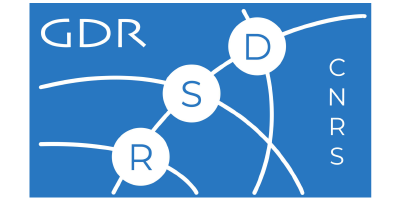The 2nd International Workshop on Network Intelligence (NI 2019)
Machine Learning for Networking
Monday, 29 April, 2019● 8:15 – 18:45 ● Room: Scene F
Technically Sponsored by IEEE Communications Society, Technical Committee on Cognitive Networking, Technical Committee on Big Data, IEEE Network Intelligence Emerging Technologies Initiative
Network Intelligence considers the embedding of Artificial Intelligence (AI) in future networks to fasten service delivery and operations, leverage Quality of Experience (QoE) and guarantee service availability, also allowing better agility, resiliency, faster customization and security. This concept is envisioned as mandatory to manage, pilot and operate the forthcoming network built upon SDN, NFV and cloud.
The main goal of the Network Intelligence Workshop is to present state-of-the-art research results and experience reports in the area of network intelligence, addressing topics such as artificial intelligence techniques and models for network and service management; smart service orchestration and delivery, dynamic Service Function Chaining, Intent and policy based management, centralized vs. distributed control of SDN/NFV based networks, analytics and big data approaches, knowledge creation and decision making. This workshop offers a timely venue for researchers and industry partners to present and discuss their latest results in Network Intelligence, and specifically “Machine Learning for Networking”. Machine learning in particular perfectly matches the complex, dynamic and time-varying nature of today’s networking systems.
General Chairs:
Mérouane Debbah (CentraleSupélec, France)
Baochun Li (University of Toronto)
Giovanni Schembra, University of Catania, Italy
Dapeng Oliver Wu (University of Florida)
Technical Program Chairs
Laura Galluccio, University of Catania, Italy
Qiuyuan Huang, Microsoft Research, Redmond, WA, USA
Yunhuai Liu, Peking University, China
Mohamed Faten Zhani, Universitè du Quebec, Canada
Steering Committee
Imen Grida Ben Yahia (Orange Labs, France)
Laurent Ciavaglia (Nokia Bell Labs, France)
Weverton Cordeiro (UFRGS, Brazil)
Mérouane Debbah (CentraleSupélec, France)
Laura Galluccio (University of Catania, Italy)
Baochun Li (University of Toronto)
Noura Limam (University of Waterloo, Canada)
Giovanni Schembra (University of Catania, Italy)
Dapeng Oliver Wu (University of Florida)
Mohamed Faten Zhani (École de Technologie Supérieure, Canada)
8:15 – 8:30
Opening Session
Chairs: TBD
8:30 – 10:00
S1: ML for Network design, management and orchestration
Optimizing Degree Distributions of LT-based Codes with Deep Reinforcement Learning
Yehor Savchenko and Yi Liu (Beihang University, P.R. China)
PIQoS: A Programmable and Intelligent QoS Framework
Udaya Bhanu Lekhala and Israat Haque (Dalhousie University, Canada)
Sparse Control and Data plane Telemetry features for BGP anomaly detection
Jose Cordova Garcia (ESPOL, Ecuador & Stony Brook University, USA)
Network Traffic Prediction based on Diffusion Convolutional Recurrent Neural Networks
Davide Andreoletti (University of Applied Sciences of Southern Switzerland, Switzerland); Sebastian Troia and Francesco Musumeci (Politecnico di Milano, Italy); Silvia Giordano (University of Applied Sciences and Arts of Southern Switzerland (SUPSI), Switzerland); Guido Maier (Politecnico di Milano, Italy); Massimo Tornatore (Politecnico di Milano & University of California, Davis, Italy)
10:00 – 10:30
Coffee Break
10:30 – 11:15
Keynote Session: Prof. T. Znati, University of Pittsburg
A Perspective on Intelligence Cyber Security in Emerging Ubiquitous and Pervasive Environments
Abstract
With the advent of new computing paradigms and the proliferation of ubiquitous technology, Distributed Denial of Services (DDoS) attacks have been growing dramatically in frequency, sophistication and impact. Traditional security measures to defend against DDoS attacks focused on stochastic analysis of network traffic and on exploiting its entropy to identify anomalous network behavior. Recently, the trend to mitigate the impact of DDoS attacks is to incorporate “intelligence” into the defense architecture, leveraging artificial intelligence and machine learning techniques to detect malicious traffic. In this keynote, I will explore the new threat landscape, including the complexity of the security infrastructure and how disruptive technology is enabling not only the development of intelligent security strategies but also the proliferation of “smarter”, more devastating multi-vector attacks. In this cat-and-mouse battle between defenders and attackers, I will discuss how artificial intelligence and machine learning based strategies are impacting cyber-security, including the opportunities they present and the challenges they face, as the sophistication of the attacks continue to increase. The keynote will conclude with the discussion of possible areas of research to enable intelligent security frameworks in ubiquitous and pervasive environments.
Short Bio
Dr. Znati is a Professor and Chair of the Department of Computer Science, School of Computing and Information at the University of Pittsburgh. He also served as the Director of the Computer and Network Systems Division and led the Information Technology Research Initiative at NSF. Dr. Znati's main research interests are in building secure and reliable networked systems, focusing on intelligent infrastructure for DDoS mitigation, and on designing fault-tolerant computational models for energy-aware resiliency in extreme-scale systems. Dr. Znati has served as the General Chair of several main conferences, including GlobeCom 2010, INFOCOM 2005, and SECON 2004. He served or currently serves as a member of Editorial Boards of a number of networking, distributed system and security journals and transactions. He also co-chaired the Network and Information Research and Development – Large Scale Networking and served in the Internet2 Research Advisory Council, for Developing Strategies for Excellence in Internet2 in Support of Research.
11:15 – 12:45
S2: ML for Cellular and Wireless Networks Planning
Node Centrality Metrics for Hotspots Analysis in Telecom Big Data
Emil Mededovic (RWTH Aachen University, Germany); Vaggelis G. Douros (Institute for Networked Systems, RWTH Aachen University, Germany); Petri Mähönen (RWTH Aachen University, Germany)
Self-Organizing Cellular Radio Access Network with Deep Learning
Wuyang Zhang (Rutgers University, USA); Russell Ford (Samsung Research America, USA); Joonyoung Cho (Samsung Electronics Co., Ltd., Korea); Jianzhong Zhang (Samsung, USA); Yanyong Zhang and Dipankar Raychaudhuri (Rutgers University, USA)
α-OMC: Cost-Aware Deep Learning for Mobile Network Resource Orchestration
Dario Bega (IMDEA Networks, Spain); Marco Gramaglia (Universidad Carlos III de Madrid, Spain); Marco Fiore (National Research Council of Italy, Italy); Albert Banchs (Universidad Carlos III de Madrid, Spain); Xavier Costa-Perez (NEC Laboratories Europe, Germany)
Delay-optimal traffic engineering through multi-agent reinforcement learning
Pinyarash Pinyoanuntapong and Minwoo Lee (UNC Charlotte, USA); Pu Wang (University of North Carolina at Charlotte, USA)
12:45 – 14:00
Lunch Break
14:00 – 15:30
S3: ML for Applications
Exploring Feature Relevance for Real-time Stalling Prediction of Encrypted Video Streaming Traffic
Michael Seufert (AIT Austrian Institute of Technology GmbH, Austria); Pedro Casas (Austrian Institute of Technology (AIT), Austria); Nikolas Wehner (AIT Austrian Institute of Technology GmbH, Austria); Gang Li and Li Kuang (Huawei, P.R. China)
An LSTM-based Approach for Overall Quality Prediction in HTTP Adaptive Streaming
Huyen Tran and Duc V. Nguyen (The University of Aizu, Japan); Duong D. Nguyen (Hanoi University of Science and Technology, Vietnam); Pham Nam (Hanoi University of Science and Technology & School of Electronics and Telecoms, Vietnam); Truong Cong Thang (The University of Aizu, Japan)
FlowPic : Encrypted Internet Traffic Classification is as Easy as Image Recognition
Tal Shapira (Tel Aviv University, Israel) ; Yuval Shavitt (Tel Aviv University, Israel)
NFV Closed-loop Automation Experiments using Deep Reinforcement Learning
Zhu Zhou (Intel, USA) ; Tong Zhang and Atul Kwatra (Intel Corporation, USA)
15:30 – 16:00
Coffee Break
16:00 – 16:45
Keynote Session: Dr. Angelo Corsaro, ADLINK Technology Inc.
The Making of Edge Intelligence
Abstract
In this talk we will motivate through real-world use cases the need for bringing intelligence closer to the source of data — the edge — and identify the challenges that need to be addressed in order to make this possible. The speaker will report on his research as well as the emerging trends and innovations in hardware and software geared toward making edge intelligence a reality.
Short Bio
Angelo Corsaro, Ph.D., is Chief Technology Officer (CTO) at ADLINK Technology Inc. As CTO he leads the Advanced Technology Office and looks after corporate technology strategy and innovation. Angelo is a world top expert in edge/fog computing and a well know researcher in the area of high performance and large scale distributed systems. Angelo has over 100 publications on referred journal, conferences, workshops, and magazines. His research interests are on Fog/Edge Computing, Industrial and Consumer Internet of Things, Innovation and Innovation Management, Product Strategy, Open Source, High Performance Computing, Large Scale Mission/Business Critical Distributed Systems, Real-Time Systems, Software Patterns, Functional Programming Languages.
16:45 – 18:15
S4: ML at the Edge and in the Cloud
DeepViNE: Virtual Network Embedding with Deep Reinforcement Learning
Mahdi Dolati and Seyedeh Bahereh Hassanpour (University of Tehran, Iran); Majid Ghaderi (University of Calgary, Canada); Ahmad Khonsari (University of Tehran, Iran)
Multi-domain non-cooperative VNF-FG embedding: A deep reinforcement learning approach
Tran Anh Quang Pham (INRIA, France); Abbas Bradai (XLIM Institute, University of Poitiers, France); Kamal Deep Singh (Telecom Saint Etienne / University Jean Monnet, France); Yassine Hadjadj-Aoul (University of Rennes 1, France)
Task Dispatch through Online Training for Profit Maximization at the Cloud
Sowndarya Sundar and Ben Liang (University of Toronto, Canada)
DeePar: A Hybrid Device-Edge-Cloud Execution Framework for Mobile Deep Learning Applications
Yutao Huang (Simon Fraser University, Canada); Feng Wang (University of Mississippi, USA); Fangxin Wang and Jiangchuan Liu (Simon Fraser University, Canada)
18:15 – 18:30
Workshop Wrap up and Closing Remarks











